Sympathy Letter To Cancer Patient
[Your Name]
[Your Address]
[City, State, ZIP Code]
[Email Address]
[Phone Number]
[Date]
[Patient's Name]
[Patient's Address]
[City, State, ZIP Code]
Dear [Patient's Name],
I hope this letter finds you well, despite the challenging circumstances you are facing. I wanted to take a moment to reach out and let you know that you are in my thoughts and prayers. The journey you are on, battling cancer, is undoubtedly tough, and I want you to know that you are not alone in this fight.
I can't begin to imagine the range of emotions and physical challenges that you must be experiencing right now. It takes an incredible amount of strength and courage to navigate through such difficult times, and I am truly inspired by your resilience.
Your determination and positive spirit are an inspiration to all of us who know you. Your ability to face each day with hope and strength is a testament to your inner fortitude. Remember, even on the toughest days, there are people who care deeply about you and are here to support you in any way possible.
Please know that I am here for you, whether it's a phone call, a visit, or simply sending positive thoughts your way. If there's anything specific I can do to help or if you just need someone to talk to, please don't hesitate to reach out. Your well-being is important to me, and I am committed to being a source of comfort and encouragement throughout your journey.
In the face of adversity, it's often the small moments of connection and understanding that make the biggest difference. I hope you find comfort in the love and support of your family and friends, and may you draw strength from the beautiful memories and experiences that life has blessed you with.
Please take care of yourself and know that you are always in my thoughts. Wishing you strength, healing, and peace as you continue to face each day with bravery.
With heartfelt sympathy and warm regards,
[Your Name]
Heartfelt Sympathy Letter for a Close Friend
Dear [Friend's Name],
I just learned about your diagnosis, and my heart goes out to you. I can only imagine how difficult this must be, but I want you to know that I am here for you every step of the way.
Please remember that you are not alone, and I am ready to help in any way you need, whether it’s accompanying you to appointments, running errands, or just sitting together in quiet support.
Sending you strength, courage, and love during this challenging time.
With all my heart,
[Your Name]
Professional Sympathy Email to a Colleague
Dear [Colleague's Name],
I was saddened to hear about your recent diagnosis. Please accept my sincere sympathy during this difficult time.
If there is anything I can do to support you at work or help ease your responsibilities, please don’t hesitate to let me know. Your health and well-being come first, and we all stand behind you.
Wishing you strength and comfort,
[Your Name]
Informal Casual Message to a Neighbor
Hi [Neighbor's Name],
I just heard about your illness, and I wanted to reach out to say I’m thinking of you. If you need someone to pick up groceries, chat, or just hang out for a little while, I’m here.
Take care, and know that you have friends nearby who care about you.
Warmly,
[Your Name]
Supportive Message for Family Member
Dear [Family Member's Name],
I am sending this note to remind you that you are deeply loved and supported. We know this is a tough time, but we believe in your strength and resilience.
Please let us help with anything you need, from meals to company or running errands. We are here for you, today and always.
With all my love,
[Your Name]
Encouraging Sympathy Email for Acquaintance
Dear [Recipient's Name],
I heard about your recent health challenge, and I wanted to express my sincere support. Although we may not know each other very well, please know that I am wishing you strength and healing during this time.
Stay hopeful and take care of yourself—you have the resilience to face this journey.
Kind regards,
[Your Name]
Creative and Uplifting Letter
Dear [Recipient's Name],
Though this may feel like a stormy chapter, remember that even storms pass, and the sun will shine again. I am sending you all the positive energy and good thoughts to help you through this difficult journey.
Think of me as your cheerleader, ready to support you with laughter, stories, or a quiet ear whenever you need it.
With hope and warmth,
[Your Name]
Simple and Quick Text Message
Hi [Name],
Just wanted to let you know I’m thinking of you and sending all my love. Stay strong and remember I’m here if you need anything.
Take care,
[Your Name]
What / Why: Purpose of a Sympathy Letter to a Cancer Patient
A sympathy letter to a cancer patient is a written message expressing compassion, concern, and support for someone diagnosed with cancer.
Its purpose is to:
- Show empathy and emotional support
- Offer practical help or encouragement
- Strengthen the bond between the sender and the recipient
- Help the patient feel less isolated during treatment or recovery
Who Should Send a Sympathy Letter
- Close friends and family members
- Colleagues or professional acquaintances
- Neighbors or community members
- Support group members or mentors
- Anyone who wishes to provide comfort and reassurance
Whom to Address
- Directly to the person diagnosed with cancer
- If appropriate, copy may be sent to primary caregivers or family members
- Messages may also be addressed to a patient’s support circle if group encouragement is intended
When to Send a Sympathy Letter
- Immediately after hearing the diagnosis
- Before or after treatment begins
- During recovery or periods of struggle
- On special occasions (birthdays, holidays) while the patient is in treatment
- When celebrating milestones or positive updates in the patient’s health journey
How to Write and Send the Letter
- Begin with a warm greeting using the recipient’s preferred name
- Express genuine concern and empathy
- Offer support and practical help without imposing
- Maintain a tone appropriate to the relationship (formal, informal, casual, or heartfelt)
- Decide the mode of delivery: printed letter, email, or message
- Close with a comforting or uplifting statement and your signature
Formatting and Style
- Length: 3–5 paragraphs for letters, 1–2 paragraphs for messages
- Tone: Heartfelt, supportive, or encouraging; avoid overly clinical or sad expressions
- Wording: Simple, sincere, and positive
- Mode: Printed letter for formal situations, email or message for casual or urgent communication
- Etiquette: Respect privacy, avoid giving unsolicited medical advice, and focus on emotional support
Requirements and Prerequisites
- Have accurate knowledge of the patient’s situation
- Consider their emotional state and privacy
- Decide whether a physical letter or digital message is more suitable
- Prepare supportive ideas or offers of help before writing
Tricks and Tips for Writing Effective Sympathy Letters
- Personalize the message with the recipient’s name and specific references
- Keep it concise but sincere
- Use positive language that encourages hope
- Offer tangible support rather than vague statements
- Re-read for tone to ensure sensitivity and warmth
Common Mistakes to Avoid
- Being overly negative or focusing on worst-case scenarios
- Using clichés that may feel insincere
- Giving unsolicited medical advice
- Writing a message that is too long or overwhelming
- Neglecting to follow up after sending the letter
After Sending / Follow-up
- Confirm the letter or message was received if appropriate
- Check in periodically to offer continued support
- Respect the recipient’s space if they prefer minimal contact
- Follow up with practical help or small gestures of encouragement
Elements and Structure of a Sympathy Letter
- Greeting (Dear [Name])
- Expression of concern and empathy
- Offer of support or assistance
- Uplifting or encouraging message
- Closing statement and signature
Pros and Cons of Sending a Sympathy Letter
Pros:
- Strengthens emotional support for the patient
- Shows compassion and thoughtfulness
- Can offer practical help
Cons:
- May be awkward if tone is misjudged
- Overly long letters can overwhelm
- Risk of unintentionally sharing personal opinions about the illness
Compare and Contrast with Other Modes of Support
- Letter vs. Phone Call: Letters allow the patient to read at their own pace; calls provide immediate verbal support
- Email vs. Printed Letter: Email is faster and convenient; printed letters feel more personal and tangible
- Message vs. Gift: A message expresses empathy verbally; gifts provide practical or emotional comfort but may not convey deep words of support
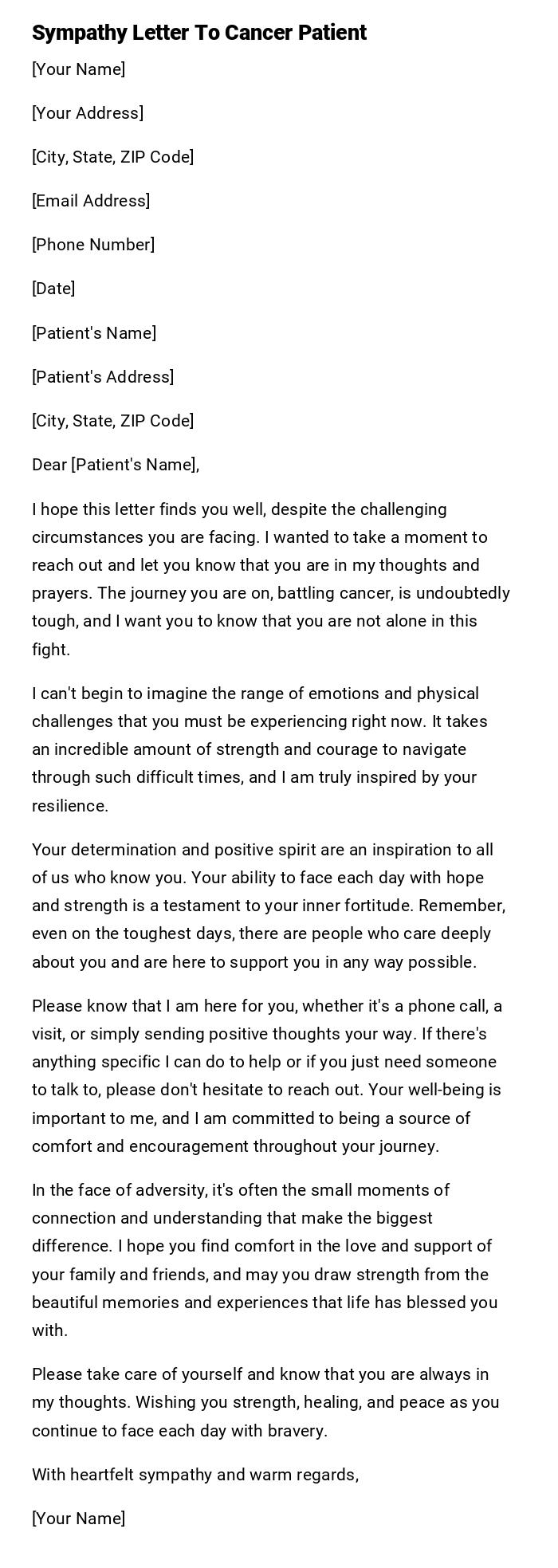
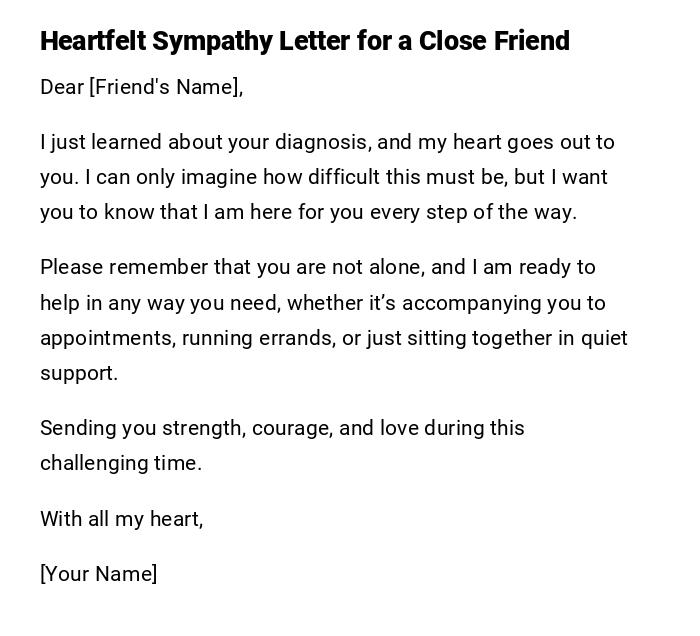
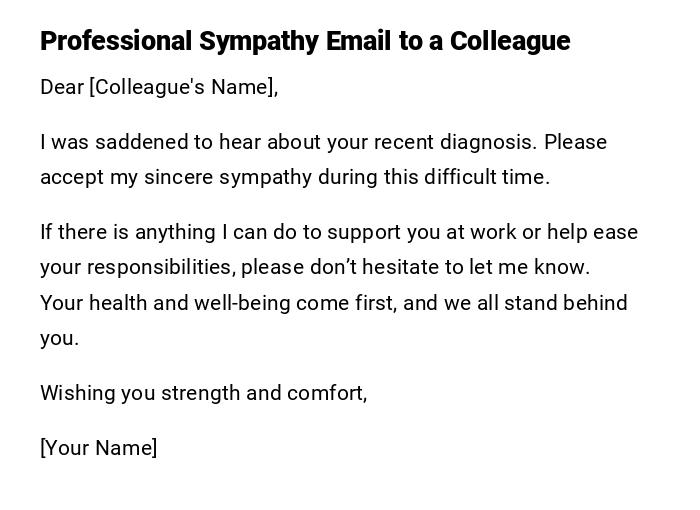
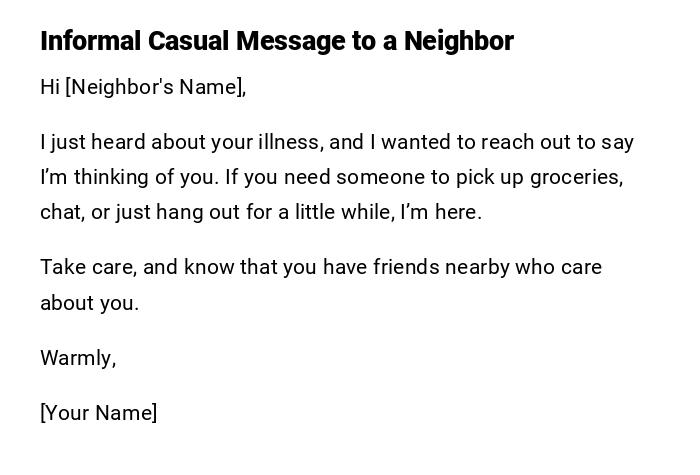
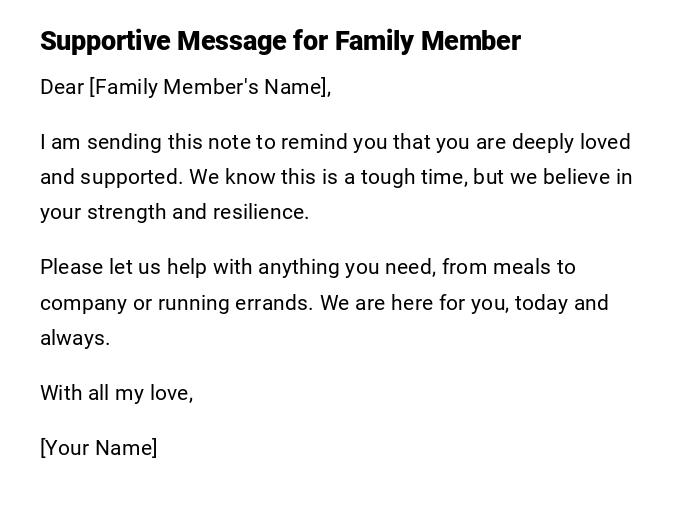
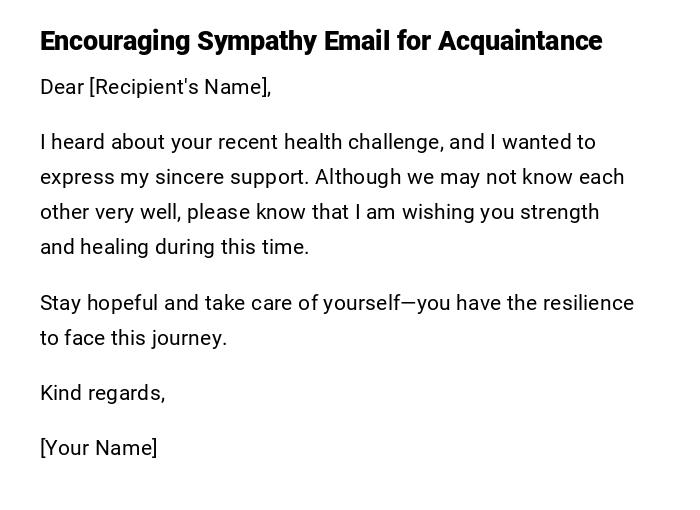
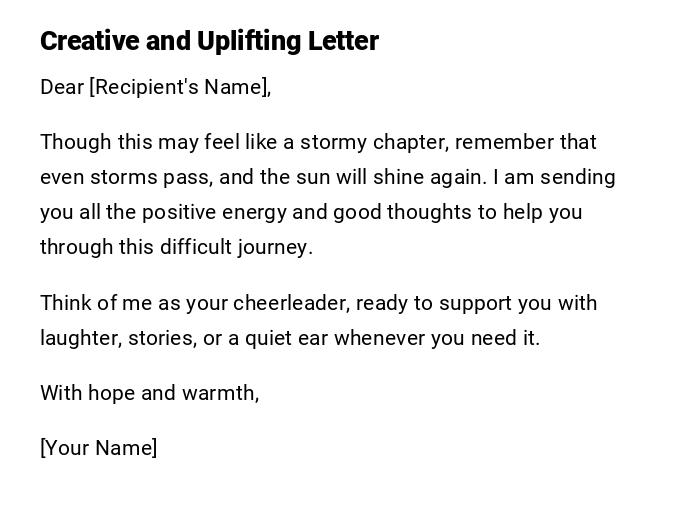
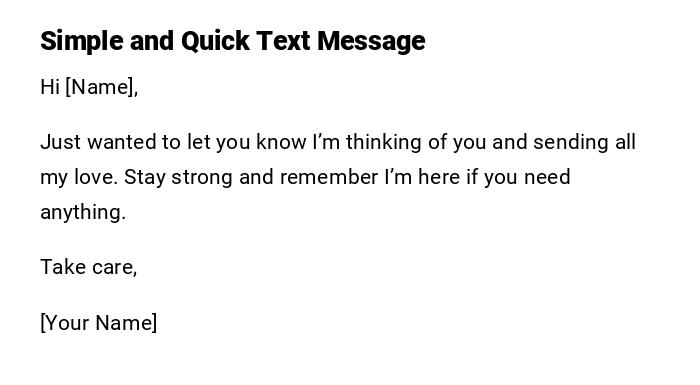

 Download Word Doc
Download Word Doc
 Download PDF
Download PDF